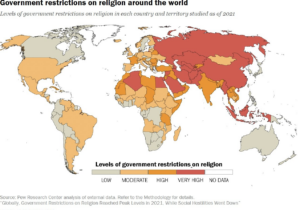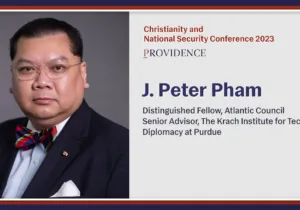On January 27, 2024, in Chhattisgarh, a state in central India, approximately one thousand Christians were forced to convert to Hinduism. The pervasiveness of forced conversions to Hinduism, or re-conversions in the eyes of Hindus that view Christianity and Islam as latecomers with no claim to legitimacy in India, is highly troubling in a democracy that professes freedom of religion for all.
India has a population of 1.4 billion, with 79.8 percent identifying as Hindu, 14.2 percent as Muslim, 2.3 percent as Christian, and 1.7 percent as Sikh. Moreover, there are smaller communities of Buddhists, Jains, Baha’is, Jews, Zoroastrians (Parsis), and those professing no religion. Article 25 of India’s constitution guarantees freedom of religion, affirming “Freedom of conscience and free profession, practice and propagation of religion.”
In practice, however, there is significant religious persecution in India, with Christians and Muslims being the primary targets. According to a report by Global Christian Relief, there are three to four attacks against Christians in India each day. In 2022, a Catholic center near Mangalore was demolished by Hindu nationalists. Moreover, hundreds of Christians have faced the looting and destruction of their homes for refusing to convert to Hinduism. Social media platforms have been used to spread extensive misinformation, promote hate speech and inflammatory rhetoric, and incite violence against religious minority groups.
Much of the persecution is carried out by the Sangh Parivar, a collective term referring to a family of organizations advocating for Hindu nationalist ideology, which emphasizes the cultural and religious supremacy of Hindus in India. The Sangh Parivar includes various groups such as the Rashtriya Swayamsevak Sangh (RSS), the major Hindu nationalist political party, the BJP, and the Bajrang Dal, a militant youth wing. Collectively, the Sangh Parivar has been accused of involvement in incidents of religious intolerance and violence against religious minorities, including Christians, with attacks on churches and harassment of Christian communities being reported.
The Sangh Parivar alleges that some Indians have been forcibly converted to Christianity by Christian missionaries, claiming that such conversions are often accompanied by inducements or coercion and are detrimental to Hindu culture and traditions. In response to these allegations, some groups associated with the Sangh Parivar have organized campaigns and events aimed at “re-converting” individuals back to Hinduism. These events, often referred to as “ghar wapsi” or “homecoming,” have been criticized as instances of forced conversion to Hinduism, particularly when accompanied by pressure or inducements.
Critics argue that these “ghar wapsi” events violate the religious freedom and autonomy of individuals and communities. They accuse the Sangh Parivar of engaging in tactics like those they condemn in Christian missionary activities. The Indian government has proposed passing an anti-conversion law, which the United Nations has warned is used to repress Christians and infringe on religious freedom. In 2022, India’s Supreme Court determined that forced conversions posed a serious threat to freedom of religion and conscience, and it called for government intervention. The court issued a statement clarifying that while they did not oppose conversion, forced conversions were deemed a violation of the constitution.
The members of Sangh Parivar adhere to an ideology of Hindutva, which translates to “Hinduness” or “Hindu-ness.” This nationalist ideology aims to define Indian culture and society based on Hindu values and traditions, emphasizing the concept of India as a Hindu Rashtra, or Hindu nation. They hold the belief that “non-Hindus, such as Muslims and Christians, are considered impure and should leave the country.”
Critics of Hindutva argue that it fosters majoritarianism and religious exclusivism, leading to the marginalization of religious minorities and undermining India’s secular and pluralistic principles. They cite instances of violence and discrimination against religious minorities, as well as efforts to restrict their rights and freedoms, as evidence of the dangers associated with Hindutva ideology.
Supporters of Hindutva, on the other hand, argue that it represents a legitimate expression of Hindu identity and pride. They assert that it aligns with the principles of democracy and pluralism. They argue that Hindutva is essential to counter what they perceive as the erosion of Hindu culture and values in India and to safeguard the interests of the Hindu majority.
In response to the forced conversion incident in Raipur, Chhattisgarh, the Archbishop of Raipur expressed concern that it marked the onset of a forced-conversion campaign. He elaborated that in this region, where a significant portion of the population is casteless, Christianity may be seen as appealing because it offers the promise of equality under God. On December 20, the Deputy Chief Minister of Chhattisgarh remarked, “We must stop the conversion of the tribal population in the State. This is a crucial question which must be addressed. We will take all possible measures within the legal framework to stop this.”
As of last year, legislation criminalizing religious conversion under various circumstances was in place in 12 of India’s 28 states. Ironically, these laws do not interpret ghar wapsi or “re-conversion” to Hinduism as forced conversion and thus offer no protection for Christians. Moreover, the laws are often so broadly written that they are not limited to coercion and may apply to voluntary conversion or the activities of missionaries and evangelists. In some states, converts are required to notify the government of their intent to convert. Additionally, several states have legislation aimed at prohibiting and criminalizing interfaith marriages. In 10 states, couples are required to publicly announce their intended interfaith marriage, leading to violent reprisals on multiple occasions. At the national level, interfaith marriages require a 30-day notice period under the Special Marriage Act. During this period, either party is given the opportunity to back out of the marriage. These laws carry severe penalties, including hefty fines and imprisonment.
Due to ongoing, sometimes egregious, restrictions on religious freedom, the United States Commission on International Religious Freedom (USCIRF) has asked the U.S. government to designate India as a country of particular concern (CPC). Only time will tell how long India’s value as an economic and geo-strategic partner will lead the West to turn a blind eye to religious persecution there.






 Sponsor a student for Christianity & National Security 2024
Sponsor a student for Christianity & National Security 2024